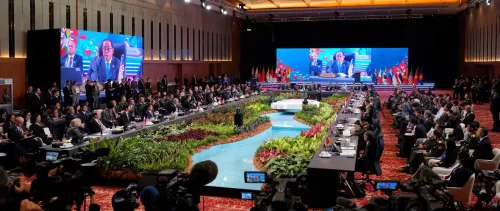
TradeTech Forum 2025 will be held in Abu Dhabi, UAE, on 8 April 2025. Image: Unsplash/Ian Taylor
This article is part of:Centre for Regions, Trade and Geopolitics
- Advanced technologies are already revolutionizing global trade.
- TradeTech Forum 2025 aims to ensure these technologies fulfil their potential in shaping a positive trade future.
- Here's what to read, watch and listen to for vital context ahead of the event.
Barely a day passes when trade doesn’t make news headlines. It cuts across every aspect of daily life, and when challenges arise, this interconnectedness can lead to disruption and uncertainty across the globe.
In recent years, water shortages in the Panama Canal, conflicts in the Middle East and Europe and multiple strikes by port workers have put supply chains under severe pressure. And while trade growth has remained stable in early 2025, uncertainty looms due to geoeconomic tensions, protectionist policies and trade disputes, according to United Nations Trade and Development (UNCTAD).

Trade and technology
When trade flows, it improves quality of life and drives economic growth. Technology – including artificial intelligence (AI), cloud computing and the Internet of Things (IoT) – is playing a pivotal role in reducing trade friction.
TradeTech, a partnership between the World Economic Forum and the United Arab Emirates (UAE), is aiming to ensure these technologies fulfil their potential in shaping a trade future where seamless cross-border commerce creates prosperity and inclusive opportunity.
Key components of the initiative include publishing reports on the trade-technology landscape, creating regulatory sandboxes in which companies can experiment with new products and services with regulators, and incubating promising start-ups in the TradeTech Accelerator.
Sandboxes in particular play a crucial role in de-risking innovation, accelerating adoption and informing smarter regulation for the future of trade. As part of this work, the TradeTech Regulatory Sandbox initiative has selected eight startups, supporting pilots in areas such as digital trade documentation, AI-driven trade finance and blockchain-based product traceability – all within regulatory sandbox environments across the UAE.
At the upcoming TradeTech Forum 2025, held in Abu Dhabi on 8 April, sandbox participants will unveil a set of regulatory recommendations emerging from this sandbox pilot. These recommendations aim to guide countries in updating trade policies to support interoperability, security and innovation in the global digital trade ecosystem.
Ahead of the event, here is everything you need to read, watch and listen to for the context behind the topics that will be covered in Abu Dhabi.
What to read
For a deeper dive into what TradeTech is and how it is working to revolutionize global trade, this explainer article is a great place to start.
This interview with the UAE’s Minister of State for Foreign Trade, His Excellency Dr. Thani bin Ahmed Al Zeyoudi, outlines the transformative potential of TradeTech and some of the areas in which it can make an impact. He also talks about TradeTech in this blog.
Artificial intelligence is emerging as a pivotal technology to strengthen supply chains for humanitarian aid. This article details how AI is being used to manage the fragmentation of global supply chains and to enhance future risk management strategies.
TradeTech’s reports explore this potential in-depth, outlining challenges, offering insights and outlining roadmaps, and presenting a vision for the future of trade. TradeTech: Catalysing Innovation examines the effect innovative technologies such as robotics, AI and IoT could have on global trade. Artificial Intelligence for Efficiency, Sustainability and Inclusivity in TradeTech homes in on the role of AI, which, as the report notes, is revolutionizing trade at “an astonishing pace”.
The Forum’s round-up of monthly trade news helps you keep a finger on the pulse of the latest developments. Read the most recent instalment here.
Meanwhile, the Forum’s Centre for Regions, Trade and Geopolitics facilitates collaboration between leaders from the public and private sectors. Engaging governments, more than 150 global countries, over 40 international organizations and over 150 civil society organizations, it is working to advance cooperative solutions to critical challenges.
What to watch
Protectionism involves restricting imports, often by putting tariffs on them to defend industries from foreign competition. In this video, Ralph Ossa, Chief Economist at the World Trade Organization (WTO), explains why this hurts the global economy.

Is there a trade-off between trade, the climate and prosperity? Not according to WTO Director-General Ngozi Okonjo-Iweala, who spoke on how trade can protect the environment instead of harming it on a panel at the World Economic Forum Annual Meeting 2025 in Davos.

In this session from Davos 2024, panellists discuss TradeTech's trillion-dollar promise.

What to listen to
The global economy is at a crossroads, the WTO’s Ralph Ossa told the Forum’s Radio Davos podcast. Read more and listen in full here.
For more on tariffs and economic nationalism, listen to this Radio Davos episode with Harvard Professor Dani Rodrik.
Ahead of the WTO's 13th Ministerial Conference in Abu Dhabi in 2024, Radio Davos spoke to Thani Ahmed Al Zeyoudi, the event's host, about MC13 and the TradeTech initiative. Listen here.
- DISCOVER
What is the World Economic Forum doing about digital trade?
What is the World Economic Forum doing about digital trade?
The Fourth Industrial Revolution – driven by rapid technological change and digitalization – has already had a profound impact on global trade, economic growth and social progress. Cross-border e-commerce has generated trillions of dollars in economic activity continues to accelerate and the ability of data to move across borders underpins new business models, boosting global GDP by 10% in the last decade alone.
The application of emerging technologies in trade looks to increase efficiency and inclusivity in global trade by enabling more small and medium enterprises (SMEs) to repeat its benefits and by closing the economic gap between developed and developing countries.
However, digital trade barriers including outdated regulations and fragmented governance of emerging technologies could potentially hamper these gains. We are leading the charge to apply 4IR technologies to make international trade more inclusive and efficient, ranging from enabling e-commerce and digital payments to designing norms and trade policies around emerging technologies (‘TradeTech’).


